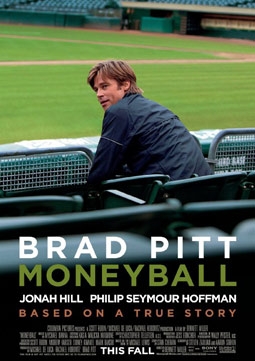



As a general rule, sports movies have more to do with the action on the field than the front office. Moneyball, starring Brad Pitt, is the baseball movie that is the exception to the rule. Moneyball depicts the true story of the Oakland Athletics, circa early 2000s. The Oakland A's were (and still are) a small market team that wanted to compete with the likes of the New York Yankees and the Boston Red Sox; two pro-ball organizations who were more financially able to put out a winning team. The Oakland A's front office, led by general manager Billy Beane (played by Pitt), decided to use advanced statistics called "sabermetrics" to find valuable players that would be overlooked by baseball traditionalists who favored traits such as a player's physical appearance.

As you've now derived from the opening paragraph, Moneyball is about the Oakland A's and their elimination from the 2001 playoffs. New Yorkers may recall that series as a thrilling comeback in a best of five divisional playoffs where the Yankees came back from a two game deficit to beat Oakland. The action in Moneyball starts there and picks up with Billy Beane (Brad Pitt), frustrated over that loss and eager to get to work on improving his baseball team. However, Beane is immediately given the obstacle of replacing several of his best players who are leaving Oakland for bigger contracts elsewhere. During his travels to try to trade for new players, he stumbles across Peter Brand (played by Jonah Hill) who tells Beane about an overlooked and largely mathematical approach to evaluating pro-baseball talent. We travel along with the ups and downs of Billy Beane and his Oakland A's, as they go through the 2002 baseball season.

Brad Pitt is the main selling point of Moneyball, just in case you have not seen one of the film's advertisements. On the poster, Pitt is sitting in the stands, looking back hopefully. That about sums up his performance in Moneyball, and I mean that in a good way. For anyone out there who may happen to be a fan of Brad Pitt, yet not big on baseball, his performance is likable enough to keep you entertained. Jonah Hill, who is taking a break from his normal shtick, is surprisingly good as Billy Beane's assistant extraordinaire, Peter Brand. As a baseball fan, most of the acting surrounding the Oakland A's staff and its players is close enough to the real article to be an acceptable impression. Philip Seymour Hoffman is effective as Art Howe, the A's curmudgeon manager. It should be no surprise that the stronger scenes in Moneyball are based around the interactions between Art Howe and Billy Beane regarding how the Oakland A's should be coached.

While baseball may not be the most popular sport these days, it does have a passionate following of die-hard fans. As such, this is the prime demographic for a movie like Moneyball. Most of the actual "sabermetrics" involved are glossed over to be accessible to a mainstream movie-going audience. There may also be some bristling from the baseball crowd regarding the economics and logistics presented, in that it is overly simplified (an approach I feel did a great service to the film). As a documentation of the Oakland Athletics' 2002 season, Moneyball is surprisingly entertaining.

Moneyball is at its best when the action is centered on the game of baseball. This is something that non-sports fans will not want to hear. For instance, a major subplot is built around Billy Beane's (Brad Pitt) relationship with his daughter. I understand the need to show that he is not a baseball obsessed robot, however, it feels forced to try to give the Brad Pitt crowd something to latch on to besides on-base percentage and win shares. This subplot ends up making Moneyball about a half hour longer than the movie needs to be, and it stops a lot of the film's momentum. After all, in most sports movies, the best parts come in whatever respective arena our protagonists work in.
To that end, baseball fans will immediately associate Moneyball as "The General Manager Movie," because that's what it really is. While we occasionally check in with the boys on the field, there is a lot more of Brad Pitt's character wheeling and dealing for the team, as Moneyball's main plot point.
Moneyball manages to present an interesting perspective (though its accuracy is open to debate) on the sport that some fans will really enjoy. If you happened to be a baseball fan during this 2002 season, you may actually remember a lot of the events that take place, making for an interesting trip down memory lane. However, if you don't know the difference between a ball and a balk, you will still find yourself invested in this underdog story.
Moneyball
Rated PG-13. Runtime 126 min. Theatrical release 9/23/2011
PR.com Rating: B
